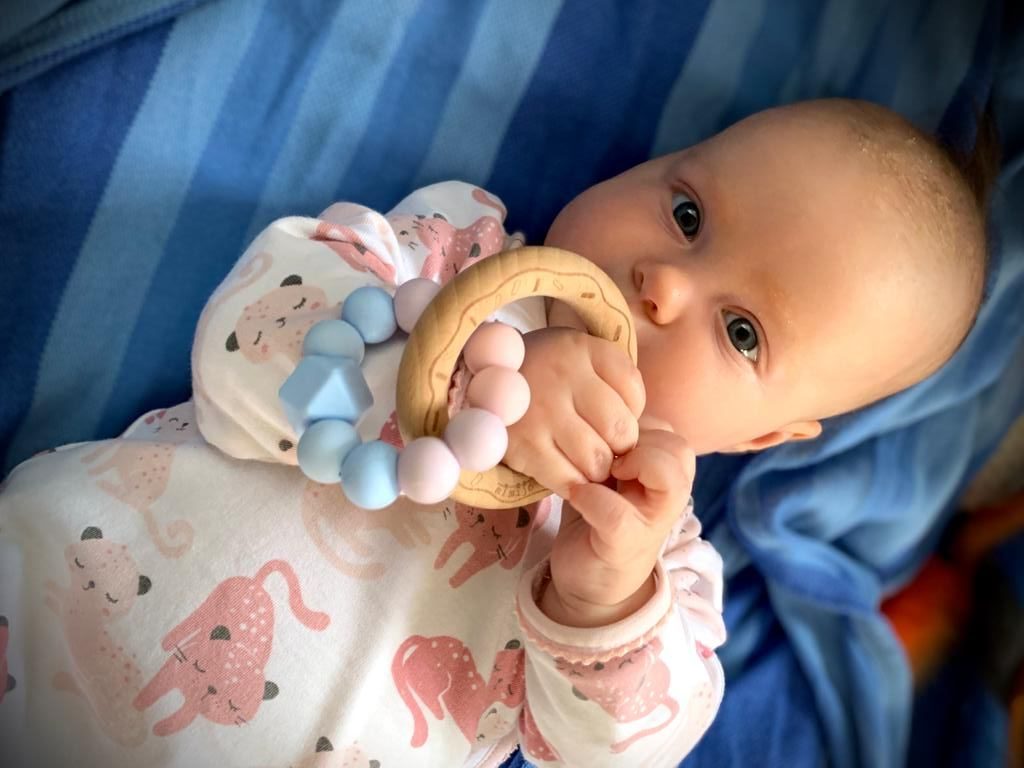Montessori from Birth: Symbiotic Life

Building a new Relationship
Montessori goes beyond a method of education to an understanding of how to support natural development. Maria Montessori’s philosophy and developmental theories help us understand what the development needs are at certain points in life and the practice and implementation help us follow each child’s individual inner guide or developmental path through kindness and respect. Symbiotic life in Montessori theory is the first 6 to 8 weeks of a baby’s life also known as post-partum or the fourth trimester. A mother and a baby both need each other at this point in life and create a symbiotic relationship. A mother has just lost part of her body that she has been carrying for the past 9 months. A baby has just lost their warm familiar home in their mother’s womb. Being together in these first weeks are so important for the physical and psychological wellbeing of both mother and child.
The world outside the womb is so different the baby must immediately start breathing and not long after their digestive system has to start working to pass meconium (a dark tar-like bowel moment that passes what was in the baby’s intestines in the womb). The best way to help both of these is to do skin to skin immediately after birth. Skin to skin provides important points of reference for the baby that reduce stress. For example, while laying on their mother’s chest they can hear mom’s heartbeat as they did in the womb, hear her voice and her nipples release a fluid that smells similar to her amniotic fluid. Babies will smell this and wiggle their way over to the breast.

Explore the fundamentals of Montessori parenting with this free video by Sylvia Arotin, offering insights and strategies to empower and educate your child.
Babies are very dependent but not helpless and as always in Montessori practice, we treat all life with respect. A baby’s absorbent mind will learn through their interactions with their mother how to form an intimate bond and relationship. Depending on how you hold them, handle them and feed them will set their expectations for all future relationships to come. How can we establish a respectful relationship?
Respect their body.
- Babies have the reflexes to pull the nipple all the way back to their soft pallet where they can get the most milk when they nurse. Just place the baby so their lips are touching your nipple. They may play for a moment and that’s fine. Think of how you would like someone to feed you. The way you feed your baby teaches them how other people should respect their body.
- Continue skin to skin as much as possible but when clothing is needed choose comfortable, easy to put on clothing that can be put on with minimal moving of the baby’s body. Outfits like rompers that button or snap all the way down the front are ideal. Avoid over the head outfits.
‘On-demand’ breastfeeding
- In the first few days after a baby is born a mother’s breast produces colostrum. Skin to skin and frequent feeding during this time helps establish a good milk supply. After a few days, the milk will change so may the baby’s eating habits.
- Instead of following a schedule learn to read cues for hunger. A tight fist can be a sign they are hungry and the fist will loosen as they eat. Sticking out their tongues or rooting reflex (opening their mouth like they are looking for a breast) are also signs they are hungry
Listening and Learning their cries and body language
- Babies also cry for diaper changes, being tired wanting to be held, and loved. By learning what cry means what you are able to better meet their need deepen your relationship
Freedom of Movement
- Baby’s need to be free to stretch move and explore their body in this new open world.
- Let the baby touch their own face and body with their bare hands. The baby will remember these feelings and remember them from the womb.
Support
- Building your relationship with your baby is most important. Surround yourself with family and friends to help you with household chores, cook for you, and help take care of you so you can care for and bond with your baby.
- If you are running into breastfeeding trouble find an IBCLC (Internationally Board Certified Lactation Consultant). Breastfeeding can be a challenge sometimes and an IBCLC can help with a good latch, holding, tongue ties, low or high milk supply, and more.
The developmental goal of this symbiotic life between mother and baby is to develop basic trust. This trust is built when the baby’s needs are met in a loving and timely manner. When the baby’s needs are met they learn that the world is a safe place and feel secure. As the child begins to build their personality through their experiences this sense of security lays a loving foundation that leads to a confident and optimistic baby, child, and adult.
Written by Emily Suarez
Montessori Beginnings
YOUR ULTIMATE
MONTESSORI PARENTING COURSE
FOR ZERO TO THREE
Gain clarity and confidence in your parenting to raise a resilient, independent and joyful child.


